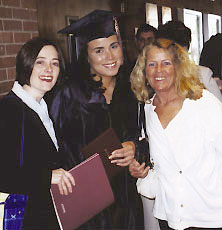News Archives - 2003
Measuring success in statistics
 |
Chandra Erdman '02 celebrated her Augsburg graduation with Dixin Shafer (left) McNair Scholars program director, and her mother, Paula Erdman (right). Erdman is currently a doctoral candidate in statistics at Yale University. |
Chandra Erdman came to Augsburg with two years of college classes already on her transcript, but had no particular major or career goal in mind. Now, one year after graduating, she has completed a master's degree and has begun a Ph.D. program at Yale University in statistics.
"I never thought I'd be where I am today," Erdman reflected, and, as she looks ahead a couple of years, the statistic she's aiming for is to become the first African-American to complete Yale's doctoral program in statistics.
Erdman came to Augsburg after spending her junior and senior years of high school at the University of Minnesota full time taking general courses. She chose Augsburg because of its small size and found a comfortable fit. She decided upon a math major because the subject really challenged her, and because of its exactness and "how things fall into place." The fact that it's a science that can be carried out entirely in one's mind, without tools or lab experiments, intrigued her.
What made the real difference in Erdman's experience at Augsburg, however, was selection as a McNair Scholar. This federally-funded program seeks to increase the number of graduate degrees earned by students from underrepresented segments of society. The 18 students who have been served each year by the program, either low-income first generation college students, students of color, or other individuals underrepresented in doctoral programs, have been involved in research and other scholarly activities to prepare them for doctoral studies.
Erdman completed two research projects while she was an undergraduate. For a summer research project in applied math, she used U.S. census counts to model the shifting residential patterns in the last four decades among blacks and whites in North Minneapolis. She presented this research as an oral presentation on campus and as a session at the McNair Scholars conference at the University of Puerto Rico.
Her second research project was in pure math, where she studied continued fractions and tried to prove a series of open-ended questions. This research was presented at a colloquium for mathematics, computer science, and physics students on campus.
As she began thinking about her vocational choices, however, it was a semester with mathematics professor Ken Kaminsky that set the course. "My favorite class was probability and statistics," Erdman said—she enjoyed the fun in probability and the usefulness of statistics. This interest, combined with a required teaching experience in calculus, which she really enjoyed, helped shape her goal to teach at the college level.
In fall 2002 Erdman began a master's program at Columbia University. "I was terrified when I first got there, thinking that everyone else was smarter than I was," she said. "But after I started getting A's, I felt I really did belong." She completed the master's degree in a year.
In seeking doctoral programs, Erdman looked not only at the school's programs, but she also called its graduate students and talked with them about their experiences. Yale's small size again seemed like a good fit to provide the comfort she sought. While interviewing there, she also connected with a faculty member who shared her interest in undercounted populations and had a project idea in mind for adjusting the counts.
Erdman admits that before joining the McNair Scholars program, she had not thought about graduate school. As a first generation college student, she grew up without role models to help her pursue education or teach her the process of learning.
In the McNair program, she learned how to conduct and present research, what graduate school is all about, and how to write applications and prepare for the grad school exams. But, most important, she received lots of support and encouragement to gain the confidence to succeed. "McNair helped me to never feel alone," Erdman reflected.
She stays in contact with mathematics professors Kaminsky and Rebekah Dupont, also McNair's research director, as well as with Dixie Shafer, McNair program director.
For someone who admitted to not even knowing what the Ivy League was, Erdman has already left her mark on one of its schools and is ready to tackle another.